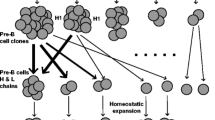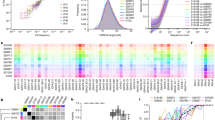Abstract
Gene libraries are a biological mechanism for generating combinatorial diversity in the immune system. However, they also bias the antibody creation process, so that they can be viewed as a way of guiding lifetime learning mechanisms. In this paper we examine the implications of this view, by examining coverage, avoidance of self, clustering and diversity. We show how gene libraries may improve both computational expense and performance, and present an analysis which suggests how they might do it. We suggest that gene libraries: provide combinatorial efficiency; improve coverage; reduce the cost of negative selection; and allow targeting of fixed antigen populations.
Preview
Unable to display preview. Download preview PDF.
Similar content being viewed by others
References
Cayzer, S., Smith, J., Marshall, J., Kovacs, T.: What Have Gene Libraries Done for AIS? In: Jacob, C., Pilat, M.L., Bentley, P.J., Timmis, J.I. (eds.) ICARIS 2005. LNCS, vol. 3627, pp. 86–99. Springer, Heidelberg (2005)
Goldsby, R.A., Kindt, T.J., Osborne, B.A., Kuby, J.: Immunology, 5th edn. W H Freeman, New York (2003)
Matzinger, P.: The Danger Model: A renewed sense of self. Science 296, 301–305 (2002)
Perelson, A.S., Hightower, R., Forrest, S.: Evolution and somatic learning in V-region genes. Research in Immunology 147, 202–208 (1996)
Hightower, R., Forrest, S., Perelson, A.S.: The evolution of emergent organization in immune system gene libraries. In: Eshelman, L.J. (ed.) Proceedings of the Sixth International Conference on Genetic Algorithms, Los Altos, CA, pp. 344–350. Morgan-Kauffman, San Francisco (1995)
Oprea, M., Forrest, S.: Simulated evolution of antibody libraries under pathogen selection. In: Proceedings of the 1998 IEEE International Conference on Systems, Man and Cybernetics, San Diego, CA (1998)
Hart, E., Ross, P.: An Immune System Approach to Scheduling in Changing Environments. In: Banzhaf, W., Daida, J., Eiben, A.E., Garzon, M.H., Honavar, V., Jakiela, M., Smith, R.E. (eds.) Proceedings of Genetic and Evolutionary Computation Conference (GECCO), July 13-17, 1999, pp. 1559–1566. Morgan Kaufmann, San Francisco (1999a)
Hart, E., Ross, P.: The Evolution and Analysis of a Potential Antibody Library for Job-Shop Scheduling. In: Corne, D., Dorigo, M., Glover, F. (eds.) New Ideas in Optimisation, pp. 185–202. K. McGraw-Hill, London (1999b)
Kim, J., Bentley, P.: The Human Immune System and Network Intrusion Detection. In: 7th European Congress on Intelligent Techniques and Soft Computing (EUFIT 1999), Aachen, Germany, September 13- 19 (1999a)
Kim, J., Bentley, P.: The Artificial Immune Model for Network Intrusion Detection. In: 7th European Congress on Intelligent Techniques and Soft Computing (EUFIT 1999), Aachen, Germany, September 13- 19 (1999b)
Kim, J., Bentley, P.J.: A Model of Gene Library Evolution in the Dynamic Clonal Selection Algorithm. In: Proceedings of the First International Conference on Artificial Immune Systems (ICARIS) Canterbury, September 9-11, 2002, pp. 175–182 (2002)
Wierzchon, S.: Deriving a concise description of non-self patterns in an artificial immune system. In: New Learning Paradigms in Soft Computing, pp. 438–458. Physica-Verlag (2002)
Bersini, H.: Why the First Glass of Wine Is Better Than the Seventh. In: Jacob, C., Pilat, M.L., Bentley, P.J., Timmis, J.I. (eds.) ICARIS 2005. LNCS, vol. 3627, pp. 100–111. Springer, Heidelberg (2005)
Aickelin, U., Cayzer, S.: The Danger Theory and Its Application to Artificial Immune Systems. In: Proceedings of the 1st International Conference on Artificial Immune Systems (ICARIS-2002), Canterbury, UK, pp. 141–148 (2002)
Author information
Authors and Affiliations
Editor information
Editors and Affiliations
Rights and permissions
Copyright information
© 2006 Springer-Verlag Berlin Heidelberg
About this paper
Cite this paper
Cayzer, S., Smith, J. (2006). Gene Libraries: Coverage, Efficiency and Diversity. In: Bersini, H., Carneiro, J. (eds) Artificial Immune Systems. ICARIS 2006. Lecture Notes in Computer Science, vol 4163. Springer, Berlin, Heidelberg. https://doi.org/10.1007/11823940_11
Download citation
DOI: https://doi.org/10.1007/11823940_11
Publisher Name: Springer, Berlin, Heidelberg
Print ISBN: 978-3-540-37749-8
Online ISBN: 978-3-540-37751-1
eBook Packages: Computer ScienceComputer Science (R0)




